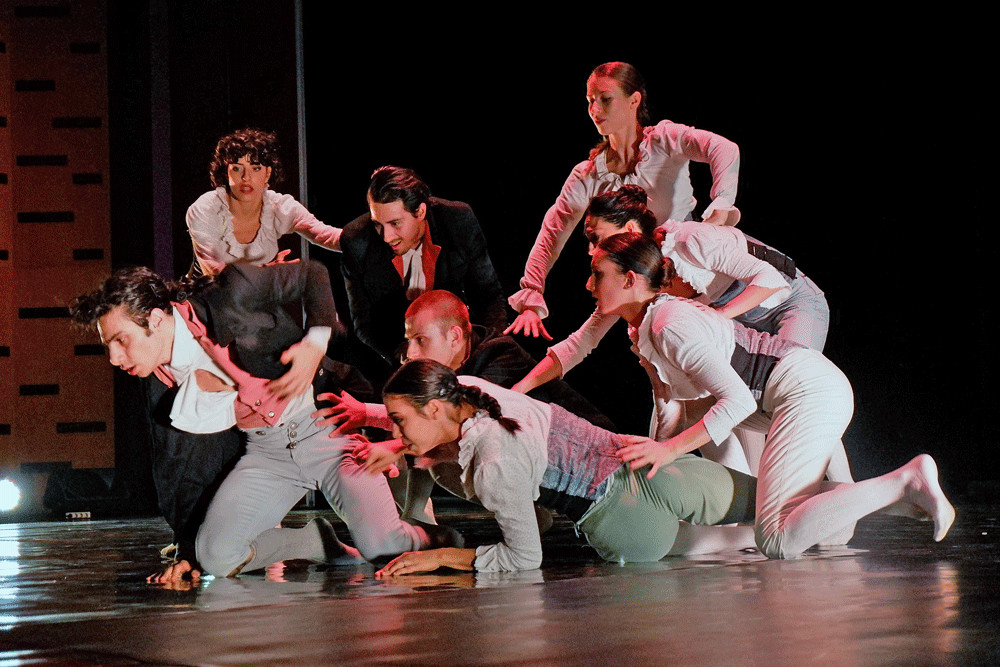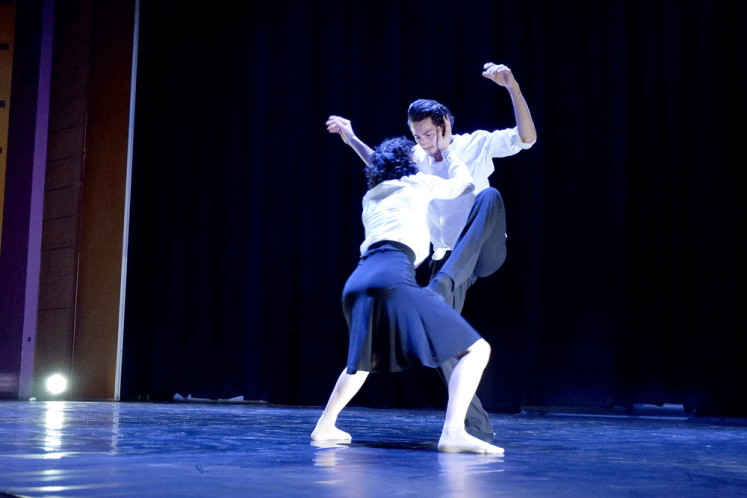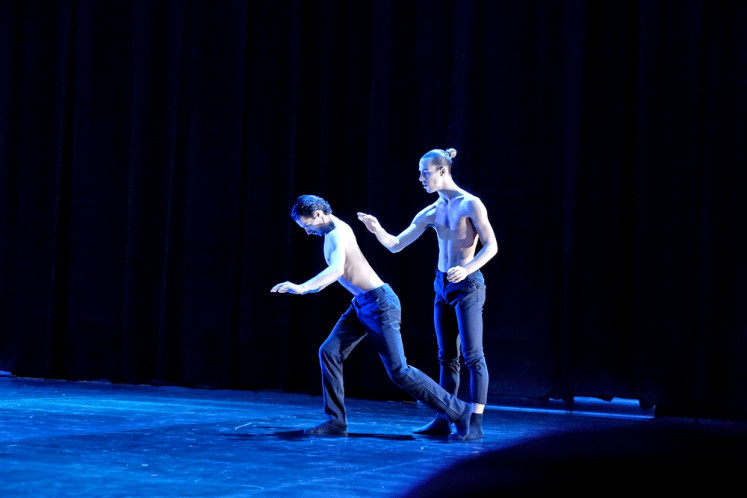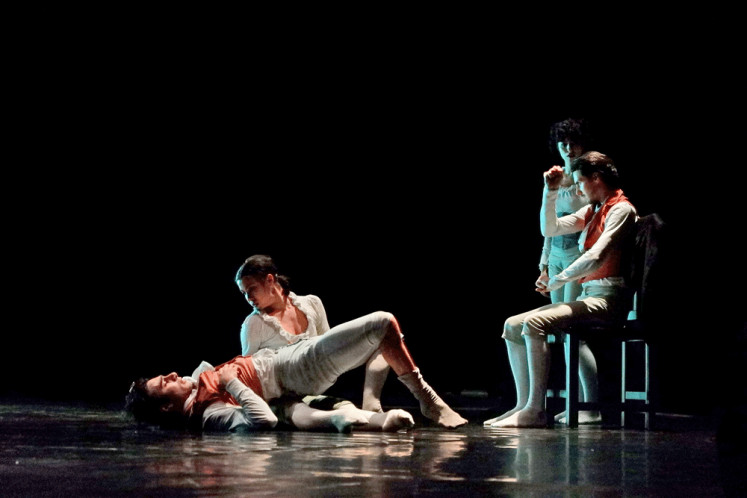Popular Reads
Top Results
Can't find what you're looking for?
View all search resultsPopular Reads
Top Results
Can't find what you're looking for?
View all search resultsLiving the night with Spellbound Contemporary Ballet
An evening with Italy’s Spellbound Contemporary Ballet dance company was a tribute to Gioachino Antonio Rossini, one of Italy’s greatest composers, but also a farewell to Michela Linda Magrì, the director of the Italian Cultural Institute.
Change text size
Gift Premium Articles
to Anyone
D
ozens of people were dazzled by the dark, yet astonishing dance performance by Italy’s Spellbound Contemporary Ballet dance company during a show entitled “An Evening with Spellbound” at the Haji Usmar Ismail Film Center in Jakarta on Dec. 9.
After 12 Indonesian students of the Jakarta-based Namarina dance school opened the show with a cheerful dance piece, two shirtless men in black pants — Giacomo Todeschi and Pablo Girolami — walked straight onto the bare stage and then splendidly performed a 10-minute intimate dance piece entitled Man Made.
The pas de deux was choreographed by Mauro Astolfi, the founder and the artistic director of Spellbound. Under a blanket of somber light, the two men bent, twisted, grappled, torqued, stretched, crawled upon and draped themselves over one another.
After Man Made, Todeschi returned to the stage with two other Spellbound members, Mario Laterza and Maria Giovanna Cossu. They performed another of Astolfi’s best works, Formami, which is about a confused woman who does not know where to go and no one can help her when she asks for direction.
The 15-minute dance drove the audience members to imagine how it feels to have a virtual black box that can tell them directions and give them explanations about why bad things happen and what they should do to prevent them from happening again in the future.
Opened by Italian Ambassador to Indonesia Vittorio Sandalli, An Evening with Spellbound was held by the Embassy of Italy and the Italian Cultural Institute to promote contemporary art in the vivere all’Italiana (Italian way of life).
Stepping up: Spellbound dancers Giuliana Mele and Pablo Girolami perform “Hunger and Grace”. (-/A. Kurniawan Ulung)“This is the first time we performed in Indonesia,” said Valentina Marini, the director of Spellbound, who joined the company in 1996.
Astolfi has made a name for himself as one of the most noted contemporary choreographers in the European dance scene. He is known for his provocative work and symbolic language that he creates from elaborating on various forms of expressive contemporary dance movements.
He founded Spellbound in 1994 after being a dancer and choreographer for years in the United States. The dance company rose to stardom and was recognized by the Italian government in 2000 after collaborating with renowned Italian writer and dance critic Vittoria Ottolenghi, who produced public dance marathons at theaters and festivals in Italy.
Astolfi is also the artistic director of the modern contemporary department at the Dance and Arts Faculty (DAF) and a guest teacher of contemporary dance at the Opera Ballet School in Rome.
Spellbound closed its show in Jakarta with the Rossini Ouvertures dance performance to honor Gioachino Rossini, an renowned Italian opera composer who died of pneumonia 150 years ago in Paris, France.
Unlike Man Made and Formami, Rossini Ouvertures was wickedly entertaining and humorous. Performed by nine dancers, the 30-minute dance utilized several of Rossini’s iconic scores.
For Spellbound, Rossini’s music is “an organized madness” as it contains intensity, chaos and dismay. Some of his best-known operas are the Italian comedies The Barber of Seville, The Italian Girl in Algiers and Cinderella.
Rossini Ouvertures drove the audience to imagine a large wall, behind which Rossini hid his food and wine, and to imagine the house where the composer hosted his friends, fellow composers and people he loved to joke and play with and share all aspects of his life.
When creating the dance, Astolfi envisioned the wall as a projection of Rossini’s mind that is full of windows, shelves and hiding places.
Spellbound got a standing ovation from the audience at the Haji Usmar Ismail Film Center for their terrific Rossini Ouvertures performance.
“I hope they [the audience members in Jakarta] will get joy from what we love to do, which is dance,” Marini said.
An Evening with Spellbound was touching for Michela Linda Magrì because it was a farewell for her as the director of the Italian Cultural Institute.
For the last three years, she has strengthened the cultural relations and friendships between Indonesia and Italy, promoting cooperation between universities and other educational institutions in the two countries and organizing major Italian cultural events, from lectures, exhibitions and symposia to concerts, across Indonesia.
A tribute: Spellbound dancers perform the “Rossini Ouvertures”. (-/A. Kurniawan Ulung)She started her career at the Ministry of Justice in Italy, but moved to the Ministry of Foreign Affairs in 2000, specializing in the promotion of Italian culture abroad. She has been posted by the Italian government to Indonesia twice, as the deputy director of the institute from 2002 to 2007 and as the director from 2015 to 2018.
After her second post in Indonesia, Magrì, who loves to sing, dance and run, said she will stay in Rome, but for her, Indonesia is also home.
“I will never forget the beauty of this wonderful country and its people,” the 56-year-old said, holding back tears.
Her love of the country is so big that “Rayuan Pulau Kelapa” (Solace on Coconut Island), a work by one of Indonesia’s greatest composers, Ismail Marzuki, is among the songs on her playlist.
On stage, Sandalli thanked Magrì for disseminating Italian culture in Indonesia and wished her the best. “We know that you love Indonesia and you are loved by Indonesia,” the ambassador said.














